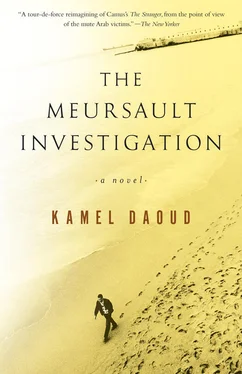Kamel Daoud - The Meursault Investigation
Здесь есть возможность читать онлайн «Kamel Daoud - The Meursault Investigation» весь текст электронной книги совершенно бесплатно (целиком полную версию без сокращений). В некоторых случаях можно слушать аудио, скачать через торрент в формате fb2 и присутствует краткое содержание. Год выпуска: 2015, Издательство: Other Press, Жанр: Современная проза, на английском языке. Описание произведения, (предисловие) а так же отзывы посетителей доступны на портале библиотеки ЛибКат.
- Название:The Meursault Investigation
- Автор:
- Издательство:Other Press
- Жанр:
- Год:2015
- ISBN:нет данных
- Рейтинг книги:5 / 5. Голосов: 1
-
Избранное:Добавить в избранное
- Отзывы:
-
Ваша оценка:
- 100
- 1
- 2
- 3
- 4
- 5
The Meursault Investigation: краткое содержание, описание и аннотация
Предлагаем к чтению аннотацию, описание, краткое содержание или предисловие (зависит от того, что написал сам автор книги «The Meursault Investigation»). Если вы не нашли необходимую информацию о книге — напишите в комментариях, мы постараемся отыскать её.
In a bar in Oran, night after night, he ruminates on his solitude, on his broken heart, on his anger with men desperate for a god, and on his disarray when faced with a country that has so disappointed him. A stranger among his own people, he wants to be granted, finally, the right to die.
The Stranger
The Meursault Investigation
The Meursault Investigation — читать онлайн бесплатно полную книгу (весь текст) целиком
Ниже представлен текст книги, разбитый по страницам. Система сохранения места последней прочитанной страницы, позволяет с удобством читать онлайн бесплатно книгу «The Meursault Investigation», без необходимости каждый раз заново искать на чём Вы остановились. Поставьте закладку, и сможете в любой момент перейти на страницу, на которой закончили чтение.
Интервал:
Закладка:
Go call Musa and tell him to bring us another round. Night is falling and we have only a few more hours before the bar closes. Time is short.
I also discovered trees in Hadjout, and a sky I could almost reach. Eventually I got admitted to a school where there were a few little natives like myself. That helped me somewhat to forget Mama and her disturbing way of watching me eat and grow, as if she intended me for a sacrifice. Those were some strange years. I felt alive when I was on the street, in school, or at the farms where I worked, but going home meant stepping into a grave or at least getting a stomachache. Mama and Musa were waiting for me, each in their own fashion, and I was almost obliged to explain myself and to justify the wasted hours I’d spent not sharpening the knife of our family’s vengeance. In the neighborhood, our shack was considered a sinister place. The other children called me “the widow’s son.” People were afraid of Mama, but they also suspected her of having committed a crime, a strange crime, otherwise why leave the city to come here and wash dishes for the roumis ? I’m sure we must have presented a peculiar spectacle when we arrived in Hadjout: a mother hiding two carefully folded newspaper clippings in her bosom, an adolescent with his eyes on his bare feet, and some raggedy baggage. Right around that time, the murderer must have been climbing the last steps of his fame. It was the 1950s; the Frenchwomen wore short, flowered dresses, and the sun would bite their breasts.
Tell you a little about Hadjout? About the people — other than Mama — I had around me there? Well, I remember the M’rabti — just their silhouettes. In the High Plateaus, their people used to be servants, they took care of mausoleums, but then they migrated to the fertile Mitidja plain, where they picked grapes and cleaned wells. There was also the El-Mellah family — you could translate that by yourself, the “salt men” — descended from the Jews of the ancient Maghreb who were forced to preserve, in salt, the heads of those among them whom the sultan had decapitated. As for the other witnesses of my childhood, I don’t remember them very well. I have fragmented memories of quarrels between neighbors, of thefts involving blankets and clothes. One of the M’rabti boys showed me how to go back home after stealing something: You had to walk backward, because that way the rural cops couldn’t trace your footsteps! Family names were as vague and unstable as birth dates in those days, as I’ve already told you. I was the uld el-assas . Mama was the armala , the “widow”: a strange, sexless status construed as perpetual mourning, where the woman is not so much a dead man’s wife as the wife of death itself.
Yes, Mama’s still alive today, and that fact leaves me completely indifferent. I feel bad about this, I swear, but I can’t forgive her. I was her object, not her son. She doesn’t speak anymore. Maybe because there’s nothing left of Musa’s body to carve up. I recall, time and time again, the way she would crawl inside my skin, the way she would do all the talking for me when we had visitors, her passion and her nastiness and her crazy eyes when she lost her temper.
I’ll take you with me to her funeral.
The night has just turned the sky’s head toward infinity. When the sun’s not there to blind you, what you’re looking at is God’s back. Silence. I hate that word. Its multiple definitions make a lot of noise. Every time the world falls silent, the sound of raspy breathing comes back to my memory. You want another drink, or you want to leave? You should drink up while there’s still time. Look, there’s the bottle ghost again. I often run into him here. He’s young, I think, maybe around forty. He seems intelligent, but at odds with the certitudes of his time. Yes, he comes almost every night, like me. I hold down one end of the bar, and he holds down the other end, more or less, on the side by the windows. Don’t turn around, don’t. If you do, he’ll vanish.
IV
As I told you before, Musa’s body was never found.
Consequently, my mother imposed on me a strict duty of reincarnation. For instance, as soon as I grew a little, she made me wear my dead brother’s clothes, even though they were still too big for me — his undershirts, his dress shirts, his shoes — and that went on until I wore them out. I was forbidden to wander away from her, to walk by myself, to sleep in unknown places, and, while we were still in Algiers, to venture anywhere near the beach. And the sea was off-limits. Mama taught me to fear its mildest suction — so effectively that even today, when I’m walking on the shoreline where the waves die, the sensation of the sand giving way under my feet remains associated with the beginning of drowning. Deep down, Mama wanted to believe — irreversibly — that the water was the culprit, that the water had carried off her son’s body. My body, therefore, became the visible trace of her dead son, and I ended up obeying her unspoken injunction. That’s surely what explains my physical cowardice, which I of course compensated for with a restless but, to be frank, ambitionless intelligence. I was sick a lot. And throughout every illness, she’d watch over my body with a practically sinful attention, with a concern tainted by a vague undercurrent of incest. She’d reproach me for the smallest scratch as if I had wounded Musa himself. And so I was deprived of the healthy joys of youth, the awakening of the senses, and the clandestine eroticism of adolescence. I grew silent and ashamed. I avoided hammams and playing with others, and in the winter, I wore djellabas that hid me from people’s eyes. It took me years to become reconciled with my body, with myself. In fact, to this day I don’t know if I have. I’ve always kept a stiffness in my bearing, due to guilt about being alive. My arms always feel like they’re asleep, I’ve got a glum face, I look somber and sad. Like a true night watchman’s son, I sleep very little, and badly, still today — I panic at the idea of closing my eyes and falling I don’t know where without my given name to anchor me. Mama transmitted her fears to me, and Musa his corpse. What could a teenager do, trapped like that between death and the mother?
I remember the rare days when I accompanied my mother as she walked the streets of Algiers in search of information about my vanished brother. She would set a brisk pace and I’d follow, my eyes fixed on her haik so I wouldn’t lose her. And thus an amusing intimacy was created, the source of a brief period of tenderness. With her widow’s language and her calculated whimpering, Mama collected clues and mixed genuine information with scraps left over from the previous night’s dream. I can still see her with one of Musa’s friends, clinging fearfully to his arm when we passed through French neighborhoods, where we counted as intruders. She’d say the names of the witnesses to the crime, citing them one by one and giving them funny nicknames, such as Sbagnioli, El-Bandi, and so forth. Remember Salamano, the dog owner your hero says was his neighbor? Mama pronounced his name Salamandre. She cried out for revenge on “Rimon,” alias Raymond, who never showed up again. He’s supposed to be the origin of my brother’s death, the source of that imbroglio of social mores, whores, and honor, but I wonder if he ever existed. Just as I’ve come to doubt the time of the killing, the presence of salt in the killer’s eyes, and even, sometimes, my brother Musa’s very existence.
Yes, we made an odd couple, roaming the streets of the capital like that! Much later, after the story had become a famous book and departed the country, leaving my mother and me in oblivion — even though we had suffered the loss of the book’s sacrificial victim — I often went back in memory to the Belcourt neighborhood and our investigations, remembering how we’d scrutinize windows and building façades, looking for clues. When we returned home in the evening, worn out and empty-handed, we’d get funny looks from the people in the neighborhood. I think we must have been objects of compassion to some of them. One day, Mama finally got a fragile lead she could follow: Someone had given her an address. Now, Algiers was a fearful labyrinth whenever we ventured outside our perimeter, but Mama was able to find her way around. She walked without stopping, passing a cemetery and a covered market and some cafés, through a jungle of stares and cries and car horns, until she finally stopped short and gazed at a house across the street from us. It was a fine day, and I was lagging behind her, panting, because she’d been walking very fast. All along the way, I’d heard her muttering insults and threats, praying to God and her ancestors, or maybe to the ancestors of God himself, who knows. I resented her excitement a little without knowing exactly why. It was a two-story house, and the windows were closed — nothing else to report. The roumis in the street were eyeing us with great distrust. We remained there in silence for a long time. An hour, maybe two, and then Mama, without so much as a glance at me, crossed the street and knocked resolutely on the door. An old Frenchwoman opened it. The light behind Mama made it hard for the lady to see her, but she put her hand over her brow like a visor and examined her visitor carefully, and I watched uneasiness, incomprehension, and finally terror come over her face. She turned red, fear stood in her eyes, and she seemed about ready to scream. Then I realized Mama was reeling off the longest series of curses she’d ever pronounced. The lady at the door started to get agitated and tried to push Mama away. I was afraid for Mama, I was afraid for us. All of a sudden, the Frenchwoman collapsed unconscious on her doorstep. People had stopped to watch, I could make out their shadows behind me, little groups had formed here and there, and then someone shouted the word “Police!” A woman cried out in Arabic, telling Mama to hurry, to get away fast. That was when Mama turned around and shouted, as if she was addressing all the roumis in the world, “The sea will swallow you all!” Then her hand grabbed me, and we took off running like a pair of maniacs. Once we got back home, she barricaded herself behind a wall of silence. We went to bed without supper. Later she would explain to the neighbors that she’d found the house where the murderer grew up and had insulted his grandmother, maybe, and then she’d add, “Or one of his relatives, or at least a roumi , like him.”
Читать дальшеИнтервал:
Закладка:
Похожие книги на «The Meursault Investigation»
Представляем Вашему вниманию похожие книги на «The Meursault Investigation» списком для выбора. Мы отобрали схожую по названию и смыслу литературу в надежде предоставить читателям больше вариантов отыскать новые, интересные, ещё непрочитанные произведения.
Обсуждение, отзывы о книге «The Meursault Investigation» и просто собственные мнения читателей. Оставьте ваши комментарии, напишите, что Вы думаете о произведении, его смысле или главных героях. Укажите что конкретно понравилось, а что нет, и почему Вы так считаете.












